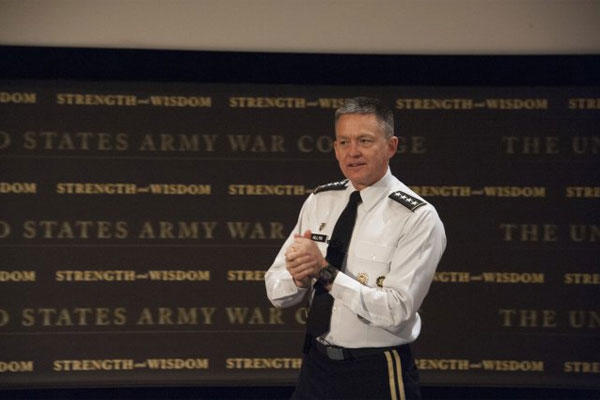CARLISLE, Pa. -- Army Vice Chief of Staff Gen. Daniel B. Allyn addressed the senior U.S. and international military officers and civilian leaders during the Army War College's, or USAWC's, Army Leader Day, April 7.
Allyn was accompanied to Carlisle by principal Army staff officers, who followed the keynote discussion in seminar engagements, giving 16 students the opportunity for in-depth one-on-one discussions with the leader.
Army Leader Day creates the opportunity for students to hear from the Army's top leaders on how they make decisions at the strategic level, how they operate in the interagency environment, and how they can achieve lasting change in a large organization that is the Pentagon, said Maj. Gen. Bill Rapp, USAWC commandant.
"What will stay with me is that not everything is 'sweet,' there is a part of Army life that is challenging and concern for Soldiers is always close to the minds of senior leaders, who must try to find a balance," said Polish Fellow Col. Robert Drozd, following the presentation in Bliss Hall. "He shared with us about team work and creating a learning organization. This means a lot to me - that he is a four-star [general] and very honest in his conversation."
Allyn spoke of balance, leader development, and the senior leader's obligation to exemplify what is expected of the junior officers, who will be the agile leaders for a high-performing "winning" Army for a complex and extraordinarily unstable world.
The Army Operating Concept is driving how we are posturing our Army for the future, but the strategy hinges completely on how well Army leaders show "relentless commitment to leader development," he said. "It's absolutely critical that we sustain that focus. It's really what's sustaining our Army and our joint force through this period of instability and strategic transition. It's what will ensure that ... we remain the dominant landpower on the globe," said Allyn.
He recounted the story of A Company commander, from 173rd Airborne Brigade Combat Team, who deployed his company into Lithuania. "As he was flying up there … I suspect he had probably four or 500 thoughts about what his responsibilities were going to be, what he needed to be prepared for, how his unit would be postured to seize the opportunity … and I guarantee that nowhere in that 500 was, 'And I better be ready to be met by the president of Lithuania as soon as I step off.'"
"This is the environment that our leaders at the tactical level are currently operating in. They truly are strategic warriors, who have to sustain the same level of tactical competence, mastery of all their tactical acumen - and, be ready to be strategic intercessors on behalf of the United States of America. This is the new norm for leadership responsibilities," he said, about small unit deployments around the world. Our responsibility is to adapt our leadership development practices to ensure that they are ready to fulfill this responsibility and that they will thrive in this environment.
He offered guidance on role model expectation as touch points for shaping adaptive leaders:
• Exemplify mission command at every level - continue the empowerment and accountability that has enabled our success on the battlefields in Iraq and Afghanistan.
• Exemplify and drive cultural change by connecting top-down focus with a bottom-up approach to empower the first line leader to take ownership for our Profession. For example, the Sergeant Major of the Army is introducing the belief, "Not in my squad, Not in this Army: trusted professionals," as a grounding for trusted professionals.
• Drive culture change in your organization through day-to-day decisions that send the message of what you expect. Risk management is an example. About the USAWC study by Leonard Wong and Stephen Gerras, "Lying to Ourselves," he addressed the risk dialogue that must occur at echelon between commanders: battalion commanders giving priorities to company commander … company commanders highlighting what cannot then be done … and, battalion commander saying, "I underwrite that risk.' "That's a conversation we are not having in our echelons today - and we have to change that," said Allyn, noting that the future brigade-level commanders in the audience will have primary responsibility for company commanders, and the ability to change this critical area through discussions about risk. "We have mastered this in combat; we have to re-master it back in our garrison, training, and preparation for war staging operations."
• Exemplify an opportunity-based approach - and the whole organization will seize an emerging challenge as, instead, a great opportunity to solve a really hard problem today for the Army.
• Work collaboratively and inclusively. "The days of being able to be the main effort and solve a problem with no external help: those aren't the problems that we face today." Connect with leaders across the joint force and the international team represented in the Army War College student body.
A member of the joint force weighed the Army-centric insights from the vice chief of staff, and recognized common ground. "It was enlightening for all the services with regard to sequestration, budget, force drawdown, how we'll maintain a balance of excellence, and how we'll maintain our current requirements across the globe with the personnel drawdowns and limited resources," Marine student Lt. Col. Daren Erickson said.
"The biggest concern is the force drawdown - to keep the good people and not lose faith with the people we've got to say goodbye to," Erickson said.
"It was refreshing to hear a senior leader not brush off the Gerras-Wong article and address that as not-a-new problem, but a problem that we can get at by leaders setting priorities, assuming risk, and underwriting that risk," Army student Col. Brett Gordon said. "I think that message needs to hit that audience and also go further down."




























